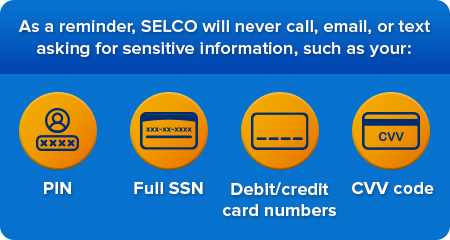It can happen to anyone, and across all levels of familiarity with technology.

Older generations, often targeted by scams and identity theft, are now matched by their Gen Z counterparts, whose comfort level with technology for everyday online transactions makes them particularly vulnerable.
When someone’s identity is stolen, the victim’s financial health can be damaged and can take months, or even years, to repair. Fortunately, there are steps you can take to prevent yourself from becoming the next victim.
- Sign up for alerts in digital banking. Once you’re set up in digital banking, we recommend enabling subscription and security alerts. If you notice a transaction you didn’t make, contact us right away.
- Consider a mobile wallet for added protection. Mobile payment services like Apple Pay, Samsung Pay, and Google Pay allow shoppers to connect their mobile phones to credit and debit cards. By doing so, your data is encrypted and can’t be seen by the merchant (or anyone else). Plus, you wouldn’t have to worry about leaving your card behind. SELCO supports these technologies, and it’s becoming increasingly common for retailers (even those online) to accept these types of payments. Here's how to attach a SELCO card to a mobile wallet.
- Avoid unfamiliar online deals that seem too good to be true. There are countless “deals” out there—many of which come from scammers phishing for your personal information. Be cautious of can’t-miss deals or requests to act quickly (fraudsters will often try to force errors by creating a sense of urgency).

- Set up a personal firewall. Use strong passwords and don’t double up on them for multiple accounts (it’s a little extra work, but the peace of mind is worth it). When possible, incorporate push and multi-factor authentication or face/fingerprint ID as an extra layer of security. Beyond that, take advantage of the software that SELCO has designed to help keep accounts safe and make sure your digital banking app has been updated recently. Better yet, set your device to make automatic app updates.
- Monitor your credit. One of the best preventative measures against identity theft is monitoring your credit. At AnnualCreditReport.com, you can request your credit report weekly from each of the three major credit reporting bureaus (Equifax, Experian, and TransUnion) without damaging your credit.
- Place a fraud alert or credit freeze on your credit reports. If you don’t foresee any upcoming large purchases, consider placing a fraud alert or credit freeze on your credit reports. This can prevent criminals from obtaining credit in your name. This service is free, and you can do it yourself. And don’t worry, you can still request a free credit report even if your credit is frozen.
Identity theft can be an expensive hassle, to say the least. If you think you’ve fallen victim to a scam or fraud, contact your financial institution right away. We’re able to help, even after the fact, though the sooner you let us know the better. Above all, don’t be embarrassed if you’ve fallen victim to fraud—we’re here talking about scams and fraud because they happen more often than we’d like. Thankfully, by following the recommendations above, you’ll have a leg up on keeping you and your information safe.


